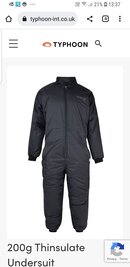Stacey9292
Registered
Hi all,
I'm new to scuba and looking for a undersuit and just needed a little advice.
I have a neoprene dry suit (not crushed) which is quite a snug fit. I'm looking for a undersuit that isn't thick and bulky but will keep me warm. I'll be diving in UK waters. In the lake the club dive most the water temperature is between 6 degrees and 15 degrees (centigrade) depending on the time of year and depth.
Any help is much appreciated.
Thank you
I'm new to scuba and looking for a undersuit and just needed a little advice.
I have a neoprene dry suit (not crushed) which is quite a snug fit. I'm looking for a undersuit that isn't thick and bulky but will keep me warm. I'll be diving in UK waters. In the lake the club dive most the water temperature is between 6 degrees and 15 degrees (centigrade) depending on the time of year and depth.
Any help is much appreciated.
Thank you






